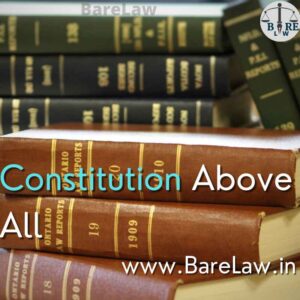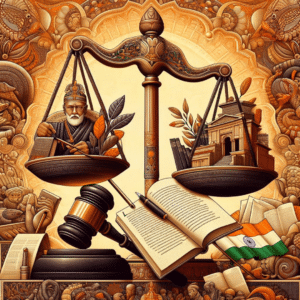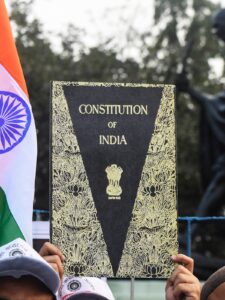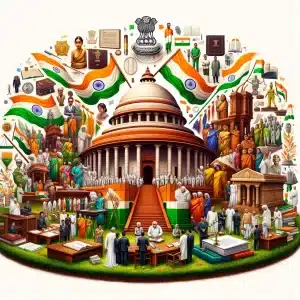Simplifying Your Life & Law | Legal Drafting services
“Power corrupts; Absolute Power corrupts absolutely”.
It may not always be interesting to read and understand any long-written constitution that serves global countries. But, with India, even though we have been using the Constitution which is a compilation of various concepts in the legal system of various nations, the intention to compile and attain the democratic setup called ‘Indian Constitution and India’ should be appreciated and an area to think of. Just imagine the scenario if a supreme law of the land favors one religion, as we see in Pakistan, and if it had renounced the concept of equality, for example, women in Afghanistan because of the Taliban’s invasion. More specifically, what if our constituent assembly members had not gone into detailed discussions and debates before enacting a provision in the constitution? All these questions that I or we as a people interrogate have been answered much prior we thought of framing a question against them or even before our educational societies start questioning them. Keeping politics of political leaders aside, isn’t it a wonderful artwork that was sculptured by our great leaders and democratic thinkers? If you are a constitutional law student or a lawyer or a person who aspire to read and understand our Constitution, this article, believing so, could help you to find out more details about the supremacy of our Constitution.
Concept of Constitutionalism:
What exactly do we mean by constitutionalism? Can a country be known for having constitutionalism, just because of the fact that it has a Constitution? It is impossible to say that a country with a constitution shall, indefinitely, have constitutionalism. This is because, any country shall have a written or unwritten constitution, but to establish whether a country has constitutionalism or not, it is important to look into the limitations that are vested on the powers of the government. So, if we speak about constitutionalism, it is the limitations that a constitution vests on the powers of the government and not whether the country has a written or unwritten constitution. Taking India as an example, the constitution of India provides the limitations of the government with respect to the amendment, legislative limits, presence of Judicial review, Independent judiciary are some of the features that in a way establish that India follows Constitutionalism, that is rule of law over the powers of the elected government.
Constitution and Three Pillars of Indian Democracy:
It is clearly understood that Indian democracy has three main pillars as per the constitution. They are Legislative, Executive, and Judiciary. Now, the question is Legislature has the power to amend the constitution, isn’t it? If that is the case, then, can it be kept above the Constitution if we give hierarchical standings?
Here is where we should take the help of Rule of law proposed by AV Dicey. One of the features or pillars of rule of law is the supremacy of laws over Kings. That is to state that Law is the king and even the king is subjected to such law. Similar way, even though there are amending powers that are vested in the Indian Legislature, not to forget that even that power is limited under the constitution. Power to amend Indian Constitution especially Part III was interpreted in several cases, and at last, we end up in a historic judgment of Kesavananda Bharati v. State of Kerala which gave us the Basic Structure of the Constitution and thereby limited the power of Legislature. This was when the supremacy of the constitution over the legislature was laid first. There have been several cases after the same.
Constitution and Judiciary:
Can Judiciary be kept at the same level as the Constitution of India? not exactly. Judiciary is itself an organ of the state established by the Constitution, which should act in accordance with this supreme law of the land. They are the sole interpreter of the constitution and effective protection of the rights of Indian Citizens. Constitution provides Judiciary with the authority to review the actions of other branches of the government, such as the Legislature – which enacts the laws, and Executive actions – which execute the enacted laws among the people. If Judiciary finds that the enacted legislation needs to be amended or should be reviewed. This power of invalidating the executive actions has been exclusively vested upon the judiciary, which also helps in upholding the Rule of law. By this, it is evident that the Judiciary is the sole executor of the Rule of law.
Looking from an international perspective, the modern concept of the judicial review has been developed in the United State of America, where the Supreme Court in Marbury v. Madison, in the year 1803, has asserted that right of the court to declare a statute invalid, if the said statute conflicts with the Constitution. This has also been ratified in Indian Constitution, by giving superior power to the judiciary in upholding the principles.
Looking at the Indian perspective, it has a written Constitution which is the fundamental law of the land. In such a country, the subject of judicial review of legislation has abiding interest and is of great significance. Any law in conflict with the constitution should be declared invalid through this power of judicial review to the extent of its repugnancy. Thus it is upon the judiciary to interpret the laws or the act of the government, which in question, to discover whether it is unconstitutional or not. Article 32, 136, 226 gives the power to Supreme Court to interpret the laws that are inconsistent with the constitution. Thus, there is no need of looking into the prejudice part of the act, since the violation of the Fundamental Rights is itself enough to render legislation void.
Conclusion:
India’s legal norms and principles are well-established and are more flexible with the changing times of our society, but the same will not apply to the basic structure doctrine and the features added to it. This is to make sure that our democratic values and principles that spread throughout the constitution, in no way, have been removed from the constitution because of political agendas. It is our supreme law and always requires supremacy above all organs and administrations. But the soul of our constitution is vested with us, meaning ‘we the PEOPLE of INDIA’. We should make sure that is not disabled through ideological and political benefits
You may also like to read:
-
05 Jul 2021 OpinionMaratha Reservation: From Legislature of Precedent
-
16 Aug 2021 Know Your LawThe preamble to the Constitution of India
-
06 Aug 2021 Case BriefsCase Brief of Justice K.S.Puttaswamy (Retired). V. Union of India and Ors, 2017 (Right to Privacy - A Grandstand View)
-
24 Aug 2021 Know Your LawOther authorities under article "12" of Constitution of India
-
09 Sep 2021 Know Your LawCONCEPT OF LEGAL AID IN INDIA
-
12 Sep 2021 Know Your LawConstitution above all





